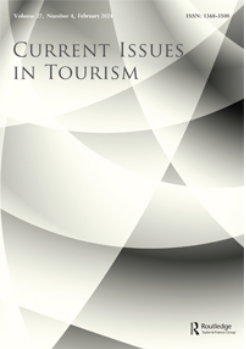从家到工作的旅程:探索通勤压力如何影响旅游和酒店业员工的工作投入
IF 4.6
3区 管理学
Q1 HOSPITALITY, LEISURE, SPORT & TOURISM
引用次数: 0
摘要
摘要现有的研究主要探讨了家庭压力和工作压力对旅游服务业员工的各种影响,但一种连接家庭和工作的新压力(即通勤压力)对他们的影响机制尚不清楚。本研究运用情感事件理论,探讨通勤压力对旅游酒店员工工作投入的影响。此外,我们还研究了不愉快情绪的中介作用和微休息活动的调节作用。一项调查由中国旅游和酒店公司的379名员工完成。结果表明,通勤压力与工作投入呈负相关,不愉快情绪起部分中介作用。微休息活动显著缓解了不愉快情绪与工作投入之间的关系,因此,微休息活动增加的效果越弱。不愉快情绪的中介效应也被微休息活动所调节。本研究为员工通勤压力与工作投入之间的关系提供了一个新的解释框架,并确定了两者之间的边界条件。研究结果为缓解员工通勤压力提供了新的思路。关键词:通勤压力、工作投入、不愉快情绪、微休息活动、情感事件理论披露声明作者未报告潜在利益冲突。本研究由国家自然科学基金项目(No. 72002050)陈玉槐、国家自然科学基金项目(No. 72302099)刘欣、中央高校基本科研业务费专项资金(No. 23JNQMX42)和中国博士后科学基金项目(No. 2023M731312)资助。本文章由计算机程序翻译,如有差异,请以英文原文为准。
The trip from home to work: exploring how commuting stress impacts on tourism and hospitality employees’ work engagement
ABSTRACTExisting studies mainly discussed the various effects of family and work-related stress on tourism and hospitality employees, but the mechanism of a newly stress connecting home and work (i.e. commuting stress) on them is unknown. Drawing on affective events theory, this study aims to investigate how commuting stress impacts on tourism and hospitality employees’ work engagement. Further, the mediating role of unpleasant feelings and the moderating role of micro-break activities are also examined. A survey was completed by 379 employees in tourism and hospitality companies in China. The results showed that commuting stress was negatively related to work engagement, and unpleasant feelings played a partial mediating role. Micro-break activities significantly mitigated the relationship between unpleasant feelings and work engagement, such that the effect was weaker as micro-break activities increased. The mediating effect of unpleasant feelings was also moderated by micro-break activities. This research provides a new explanatory framework for the relationship between employee commuting stress and work engagement while also identifying a boundary condition among them. Our conclusions offer new directions for alleviating employee commuting stress.KEYWORDS: Commuting stresswork engagementunpleasant feelingsmicro-break activitiesaffective events theory Disclosure statementNo potential conflict of interest was reported by the authors.Additional informationFundingThis research was supported by a grant from National Natural Science Foundation of China (No. 72002050) awarded to Yushuai Chen, a grant from National Natural Science Foundation of China (No. 72302099) awarded to Xin Liu and the grants from the Fundamental Research Funds for the Central Universities (No. 23JNQMX42) and China Postdoctoral Science Foundation (No. 2023M731312).
求助全文
通过发布文献求助,成功后即可免费获取论文全文。
去求助
来源期刊

Current Issues in Tourism
HOSPITALITY, LEISURE, SPORT & TOURISM-
CiteScore
15.50
自引率
10.00%
发文量
230
期刊介绍:
Journal metrics are valuable for readers and authors in selecting a publication venue. However, it's crucial to understand that relying on any single metric provides only a partial perspective on a journal's quality and impact. Recognizing the limitations of each metric is essential, and they should never be considered in isolation. Instead, metrics should complement qualitative reviews, serving as a supportive tool rather than a replacement. This approach ensures a more comprehensive evaluation of a journal's overall quality and significance, as exemplified in Current Issues in Tourism.
 求助内容:
求助内容: 应助结果提醒方式:
应助结果提醒方式:


